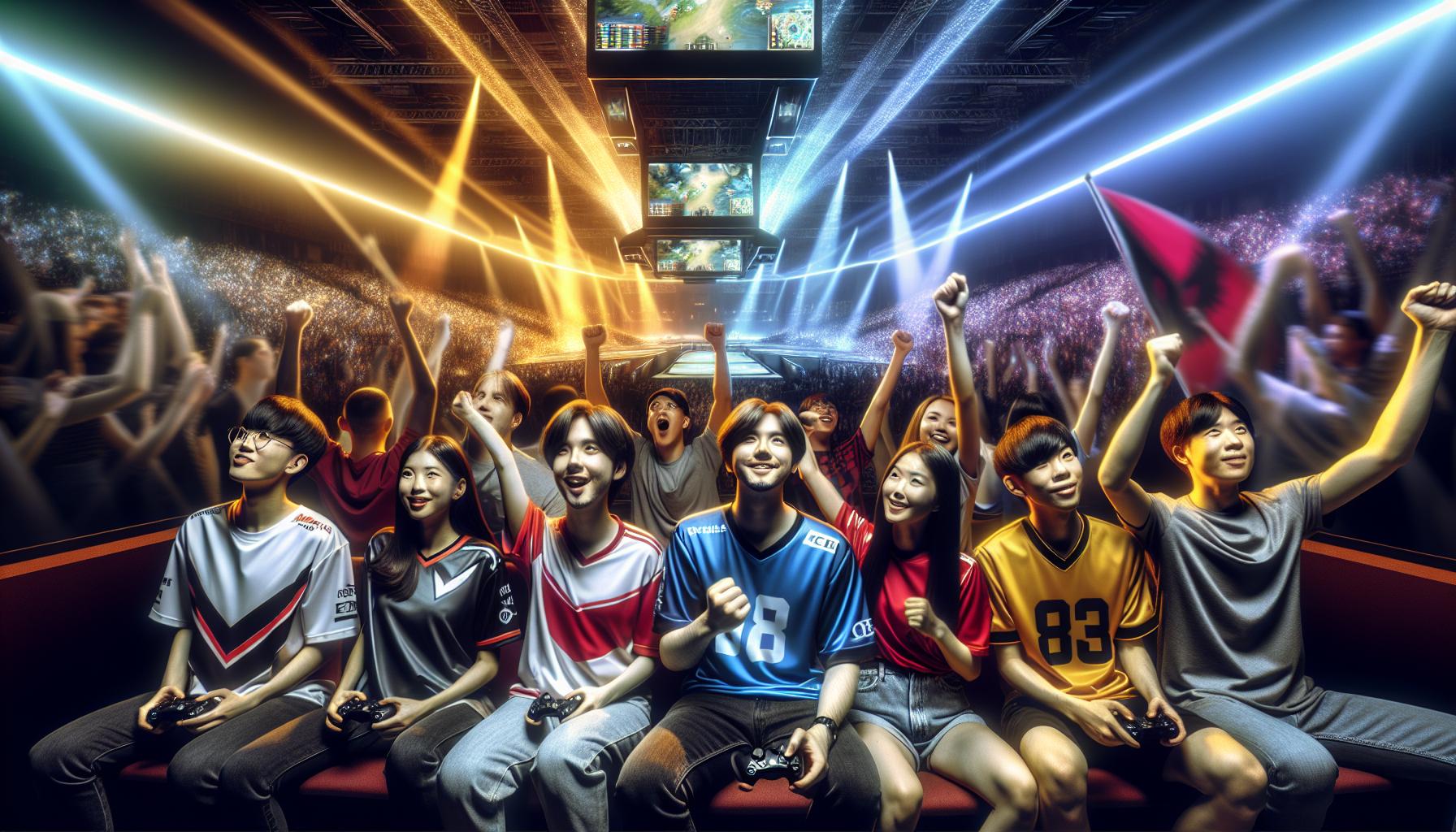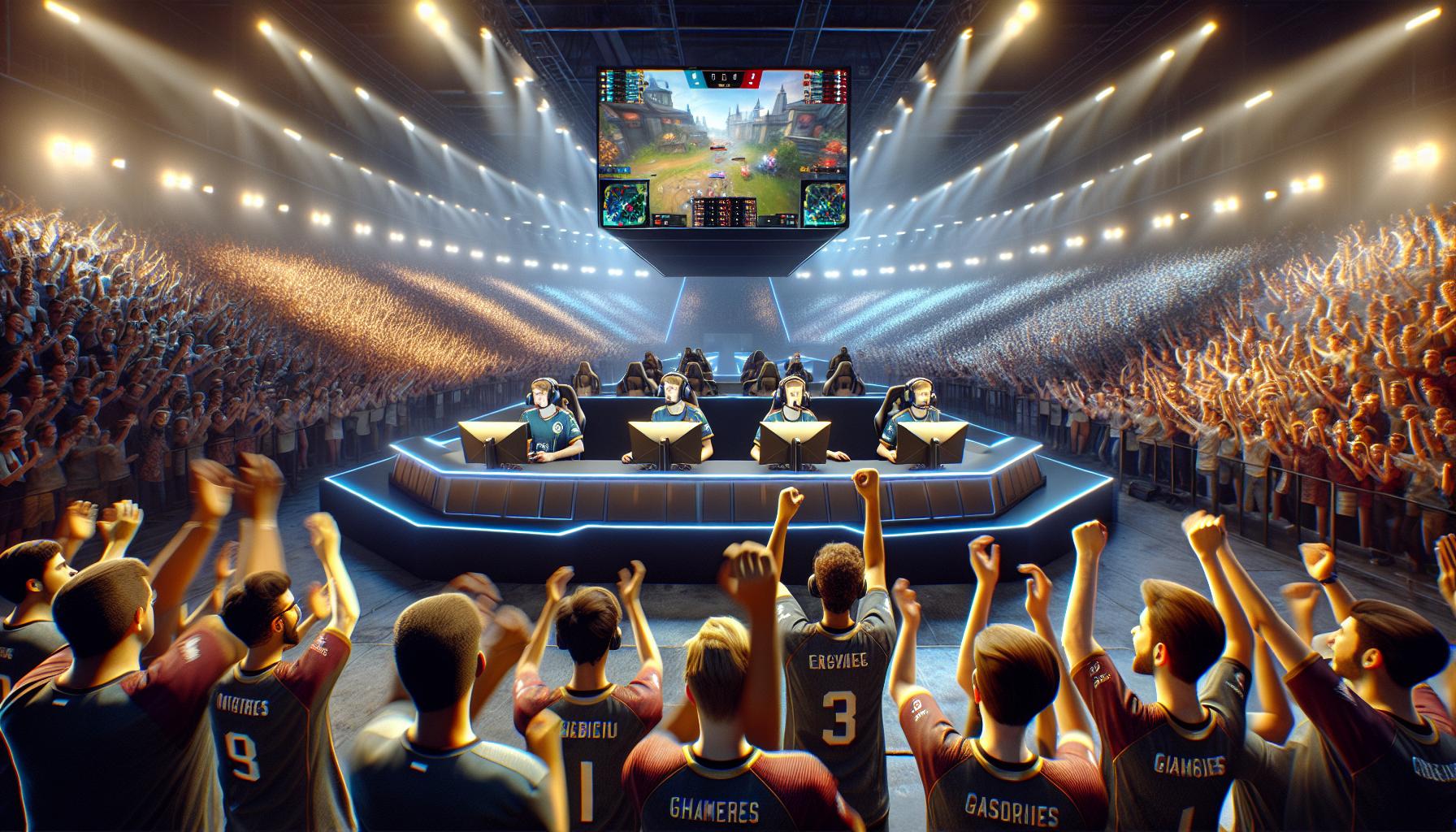Phone:
(701)814-6992
Physical address:
6296 Donnelly Plaza
Ratkeville, Bahamas.

Esports has exploded into a global phenomenon, attracting millions of passionate fans and players alike. Brands eager to tap into this vibrant community are turning to esports sponsorships as a dynamic way to connect with a tech-savvy audience.
From flashy in-game advertising to sponsoring top-tier teams, companies are finding innovative ways to showcase their products and services. It’s not just about logos on jerseys; it’s about creating authentic partnerships that resonate with players and fans. As the esports landscape continues to evolve, the opportunities for impactful sponsorships are only getting bigger.
Whether they’re seasoned marketers or just dipping their toes into the world of esports, understanding the nuances of sponsorships can give a brand a competitive edge. Dive in to discover how aligning with esports can elevate a marketing strategy to game-changing levels.
Esports sponsorships offer brands unique opportunities to connect with a global, engaged audience. Companies invest in various sponsorship types to enhance their visibility and credibility within the esports community. These sponsorships range from team partnerships and event sponsorships to in-game advertising and content creator collaborations.
Brands support professional esports teams by providing funding, equipment, and resources. In return, they receive logo placement on team jerseys, social media mentions, and exclusive content opportunities.
Companies sponsor major esports tournaments and events, gaining exposure through event branding, booth placements, and promotional activities. This association enhances brand recognition among attendees and online viewers.
Brands integrate their products or logos directly into video games. This method allows for immersive advertising experiences, reaching players in a natural and non-intrusive manner.
Collaborating with popular streamers and content creators enables brands to leverage their influence. Sponsored streams, product placements, and exclusive content help brands reach dedicated fan bases effectively.
Esports sponsorships provide several advantages for brands:
The esports sponsorship market continues to expand rapidly. In 2023, global esports revenue reached approximately $1.6 billion, with sponsorships accounting for a significant portion. Trends indicate a shift towards more personalized and integrated sponsorship strategies, focusing on long-term partnerships and innovative advertising methods.
| Year | Global Esports Revenue (USD) | Sponsorship Revenue (USD) |
|---|---|---|
| 2020 | 950 million | 450 million |
| 2021 | 1.1 billion | 525 million |
| 2022 | 1.3 billion | 600 million |
| 2023 | 1.6 billion | 750 million |
These figures highlight the increasing investment brands are making in esports, driven by the medium’s effectiveness in reaching and engaging audiences.

Sponsoring esports offers brands unique advantages in today’s digital landscape. These benefits enhance marketing strategies and drive growth.
Esports sponsorships significantly increase brand visibility among a global audience. In 2023, the esports market generated $1.6 billion, with sponsorships contributing extensively. Brands appear on team jerseys, event banners, and digital platforms, reaching millions of engaged fans. This exposure fosters brand recognition and credibility within a tech-savvy demographic. Additionally, in-game advertising allows seamless integration of brand messages, ensuring continuous visibility during competitions. Collaborations with popular esports teams and influencers further amplify brand presence, leveraging their loyal fanbases. Such strategic placements not only boost awareness but also position brands as key players in the rapidly expanding esports industry.
Engaging with the esports community drives deeper connections and loyalty. Sponsorships facilitate interactive experiences through live events, streaming platforms, and social media campaigns. Brands can host tournaments, sponsor giveaways, and create exclusive content, fostering active participation from fans. High engagement rates stem from the immersive nature of esports, where audiences invest time and emotion. This interaction translates into meaningful relationships, as fans associate positive experiences with the sponsoring brands. Data shows that targeted engagement within esports leads to higher conversion rates and sustained consumer interest. By aligning with the interests and behaviors of esports enthusiasts, brands effectively cultivate a dedicated and responsive audience.
Esports sponsorships offer diverse opportunities for brands to connect with the gaming community. Each type provides distinct advantages tailored to different marketing goals.
Team sponsorships involve brands partnering with esports teams to boost visibility and credibility. Brands display their logos on team jerseys, social media, and streaming channels, ensuring consistent exposure. This partnership builds a strong link between the brand and the team’s dedicated fanbase, fostering trust and loyalty. Data shows that team sponsorships reach targeted audiences effectively, enhancing marketing outcomes. Additionally, sponsored teams compete in international tournaments, providing global brand exposure. Collaborations often include co-branded merchandise and exclusive content, further increasing brand presence. By aligning with a team’s identity, brands gain authentic connections within the esports community, driving long-term engagement and recognition.
Event sponsorships focus on supporting esports tournaments and events to maximize brand exposure. Sponsors receive prominent placement on event banners, live streams, and promotional materials, reaching a broad audience of online viewers and attendees. Associating with major events leverages the high engagement and excitement of esports competitions. Brands can create interactive experiences, such as booths or exclusive giveaways, to attract participant involvement. Event sponsorships also provide access to valuable data, helping brands refine their marketing strategies. The global nature of many esports events ensures international recognition, allowing sponsors to connect with a diverse and tech-savvy demographic. This type of sponsorship enhances brand visibility and positions companies at the forefront of the esports industry.
Player sponsorships target individual esports athletes, offering personalized brand partnerships. Sponsors provide financial support, equipment, and resources to players, who promote the brand through their gameplay, streams, and social media channels. This direct relationship increases brand visibility on personal platforms, reaching followers who trust the player’s endorsements. Player sponsorships often include branded content, such as sponsored streams or exclusive in-game items, boosting audience engagement. Data indicates that players with strong personal brands can significantly enhance sponsor recognition and loyalty. Additionally, these sponsorships allow brands to tap into the player’s unique fanbase, fostering deeper connections and expanding market reach within the esports community. By aligning with influential players, brands achieve authentic and impactful marketing results.
Understanding the esports landscape is crucial for effective sponsorships. Brands must evaluate audience demographics to ensure alignment with their target market. For instance, knowing that the global esports revenue reached $1.6 billion in 2023 highlights the industry’s growth and potential reach.
Selecting the right partnership type can maximize impact. Team sponsorships offer visibility through logos on jerseys and social media, fostering trust among fans. Event sponsorships provide prominent placement and opportunities for interactive experiences, enhancing brand exposure during high-traffic tournaments. In-game advertising allows brands to integrate seamlessly within the gaming experience, increasing immersion and engagement.
Assessing the engagement level of different platforms ensures optimal reach. Social media campaigns and live events drive deeper connections with the community, leading to higher conversion rates. Collaborating with content creators leverages their personal platforms and fanbases, enabling authentic marketing connections that resonate with audiences.
Budget allocation plays a significant role in determining the scope of sponsorships. Allocating funds towards long-term partnerships can build sustained brand loyalty and recognition. Data-driven strategies, such as personalized and integrated sponsorship approaches, reflect current market trends and enhance the effectiveness of marketing efforts.
Measuring return on investment (ROI) is essential for tracking success. Utilizing analytics tools to monitor campaign performance provides insights into audience engagement and conversion rates. This data-driven approach allows brands to refine their strategies and achieve better outcomes.
Finally, aligning sponsorships with brand values ensures authenticity and credibility. Supporting initiatives that resonate with the esports community fosters a genuine connection, enhancing brand reputation and loyalty among fans.
| Consideration | Description |
|---|---|
| Audience Demographics | Align sponsorship with target market characteristics |
| Partnership Types | Team, event, in-game advertising, content creator collaborations |
| Platform Engagement | Utilize social media, live events, and content creators for deeper reach |
| Budget Allocation | Focus on long-term partnerships and data-driven strategies |
| ROI Measurement | Use analytics tools to track performance and refine strategies |
| Brand Alignment | Ensure sponsorships reflect brand values and resonate with the community |
Esports sponsorships are set to evolve with the industry’s expansion. Brands plan to leverage advanced data analytics to tailor sponsorships more precisely. Increased integration of augmented reality (AR) and virtual reality (VR) will create immersive advertising experiences. Companies aim to form deeper partnerships with teams and players, fostering authentic connections with fans. The rise of mobile esports presents new avenues for sponsorship, targeting a broader, on-the-go audience. Sustainability initiatives gain importance, with sponsors seeking eco-friendly partnerships to align with consumer values. Cross-industry collaborations will become more common, merging gaming with sectors like fashion and technology. Furthermore, streaming platforms will offer enhanced sponsorship opportunities through exclusive content and interactive features. Personalized marketing strategies, driven by viewer data, enable sponsors to deliver relevant and timely messages. Additionally, blockchain technology may introduce transparent and secure sponsorship transactions, increasing trust between brands and esports entities. As the global audience continues to grow, sponsors will prioritize international events to maximize their reach and impact. Finally, focusing on long-term engagements rather than short-term deals will ensure sustained brand presence and loyalty within the esports community.
Esports sponsorships offer brands a unique pathway to connect with a passionate and engaged audience. By forming authentic partnerships and leveraging innovative advertising methods, companies can enhance their visibility and credibility in this dynamic space.
As the esports industry continues to evolve, sponsors who adapt to new trends and prioritize long-term relationships will thrive. Embracing advanced technologies and sustainable practices will further solidify their position within the community.
Strategic involvement in esports not only boosts marketing efforts but also fosters lasting brand loyalty among fans worldwide. Brands that invest thoughtfully in esports can achieve significant growth and establish a strong presence in the global gaming landscape.